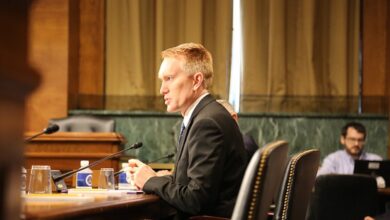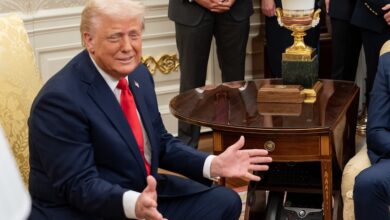Facebook, Twitter grilled by Judiciary Committee
WASHINGTON – The US House Judiciary Committee held its second hearing to examine social media filtering practices, with a special focus on a possible lack of transparency and potential bias.
Facebook’s Monika Bickert, head of global policy management, was among the executives who appeared before the Judiciary panel Tuesday.
Other executives who appeared were Juniper Downs, YouTube’s global head of public policy and government relations, and Nick Pickles, a senior strategist for Twitter.
During opening statements, all three witnesses said new policies have been put into place to protect the public and transparency.
Each said they’ve taken steps to reduce the amount of “fake news” or suspect-sourced material that can appear on their platforms.
This movement has taken on more urgency amid charges Russian operatives manipulated the platforms to spread stories for and against both candidates during the 2016 election, and President Donald Trump’s repeated attacks against “fake news.”
“As part of Facebook’s efforts we are committed to reducing false news,” Bickert told lawmakers. “We recently published a new version of our community standards. We’ve also launched a new appeals process.”
Downs said, “Products like YouTube has enabled billions to benefit. We build tools allowing people to access and share information.”
“We are dedicated to access and freedom of expression, but we have rules of the road,” he added. “We don’t allow pornography and have other restrictions.”
Meanwhile, Pickles said, “Threats of violence are an attack on free expression; the Twitter rules prevent this.”
“Accounts that violate our rules can result in complete termination,” he told lawmakers. “Every day we have to make tough calls. We don’t always get it right, but we’ve made significant process.”
Protesters Crash Hearing
Shortly after Bickert’s testimony, three protesters behind her began holding up disparaging images of Facebook officials.
They appeared to depict Facebook CEO Mark Zuckerberg and Facebook COO Sheryl Sandberg as two heads on an octopus with its legs stretched around a globe.
The protesters silently held the images for a few seconds, which could be seen on the live stream of the event.
House Judiciary Committee Chairman Bob Goodlatte then interrupted Bickert and asked the protesters to stop — which they did and then left the hearing.
Diamond & Silk Get Apology From Facebook
Bickert mentioned the April hearing in which Diamond & Silk, whose real names are Lynnette Hardaway and Rochelle Richardson, testified in front of the same committee.
“We understand their frustrations over some past communications with our team, and we recognize that we badly mishandled their concerns,” Bickert said. “We apologized to them at the time, and I’d like to extend my own personal apology to them again today.”
“While they were never banned from the platform, the message they received on April 5, 2018 that characterized their Page as ‘dangerous’ was incorrect and is not reflective of the way we seek to communicate with our community and the people who run pages on our platform,” Bickert said.
She added: “We recognize that we’ve incorrectly removed content on the other end of the political spectrum as well, and we know these incidents often garner significant public attention. We have learned from these experiences, and although we will never reduce the number of errors to zero, we are committed to improving further in this area.”
But within that statement is an untruth. Facebook rarely removes content on the political left. Ninety-five percent of content removed for political reasons has been done so against conservatives and Christians who are finding it more and more difficult to share their message on social media platforms like Facebook.
Anyone Besides Russia Using Your Social Media Sites?
Things got a bit heated when Rep. Louie Gohmert (R-TX) asked each of the witnesses whether any foreign dignitaries besides Russia inappropriately used their social media platforms?
None of the witnesses provided an answer but instead continued to speak around the question about their policies.
Rep. Gohmert said, “So you don’t know? You are just here to help Democrats talk about Russia?”
“We’ve gotten better in removing unauthentic accounts,” Facebook’s Bickert replied.
Bickert said users can now see who paid for particular advertisements.
Some conservative Republicans in Congress have criticized social media companies for what they claim are politically motivated practices in removing some content, a charge the companies have rejected.
Rep. Karen Bass (D-CA) brought up examples of liberal civil rights activist groups who have been taken off Facebook. But those examples are far and few between the greater threat against consevative groups.
“We are offering appeals,” Bickert said. “So if we get a decision wrong, we’ve increased the robustness of the appeal process.”
“We want to make sure the policies we have will respect voices across the spectrum,” she added.
Converting Facebook Into Public Utility
“What about converting the large behemoth organizations we’re talking about here into public utilities?” Rep. Steve King (R-IA) said.
King’s suggestion followed questions from other lawmakers about right-wing posts being removed on social media and how Facebook’s algorithm worked.
Lawmakers did suggest that there may be a need for a “review” of Section 230 of the Communications Decency Act.
The law protects interactive computer services from being treated as the publisher of content users post on their platforms.
If that rule is changed, social media companies could be held responsible for illegal content appearing on their platforms, such as copyright infringement or child pornography.
Social media giants said that would potentially cripple the industry, requiring extensive pre-vetting of any content they display.
Tuesday’s Judiciary hearing comes after Facebook founder and CEO Mark Zuckerberg appeared before Congress in April.
Facebook has given broad access of users’ information to former President Barack Obama’s successful re-election bid in 2012 and again worked with the Trump organization in 2016.
Facebook already operates under a 2012 consent decree with the Federal Trade Commission that required Facebook to give users “clear and prominent notice” and obtain their express consent before sharing information beyond their privacy settings.
There is a growing backlash against the efforts to reduce “fake news” on social media platforms. Free speech activists say it is not the responsibility of Facebook, Twitter or Instagram to vet news as “fake” or not because they do not have the ability to monitor billions of posts each day. Nor should it be their responsibility.
With much of the mainstream media reporting having been deemed irresponsible and often inaccurate over the last few year, critics say if they’re going to determine what is “fake” they may need to look beyond the posts of individuals and instead look at national news organizations. That’s something that is unlikely to happen in a Judiciary Committee hearing.






